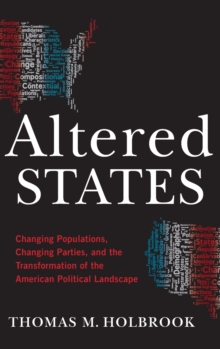Description
| Product ID: | 9780190269128 |
| Product Form: | Hardback |
| Country of Manufacture: | US |
| Title: | Altered States |
| Subtitle: | Changing Populations, Changing Parties, and the Transformation of the American Political Landscape |
| Authors: | Author: Thomas M. Holbrook |
| Page Count: | 236 |
| Subjects: | Population and demography, Population & demography, Elections and referenda / suffrage, Political geography, Elections & referenda, Political geography, USA |
| Description: | In Altered States, Thomas Holbrook looks at electoral change in presidential elections since 1972, documenting the magnitude, direction and consequences of changes in party support in the states. He finds that the Democrats do not have a "lock" on the Electoral College, but that their position has improved dramatically over the past forty years in a number of formerly competitive or Republican-leaning states in the Northeast, Southeast, and Southwest. The 2012 presidential elections represented the second consecutive defeat for the Republican Party, and the fourth defeat out of the last six presidential elections. In recent years both Republican and Democratic strategists and pundits have spoken of an emerging Democratic Party "lock" on the Electoral College and speculated that even in the wake of Republican victories in Congress, presidential candidates are still at a major disadvantage due to the party''s increasing demographic and geographic isolation. This prediction flies in the face of population shifts of the last several decades from Democratic regions (Upper-Midwest and Northeast) to Republican-leaning regions (South and Southwest); at the same time, it seems to follow from demographic changes favoring an increase in the minority vote. In fact, there is an initiative to convert Texas to a Democratic state by mobilizing Latino and Black voters. In Altered States, Thomas Holbrook looks at electoral change in presidential elections since 1972, documenting the magnitude, direction, and consequences of changes in party support in the states. He finds that the Democrats do not have a "lock" on the Electoral College, but that their position has improved dramatically over the past forty years in a number of formerly competitive or Republican-leaning states in the Northeast, Southeast, and Southwest. Republican candidates have made many fewer gains, mostly improving their position in "misplaced," formerly Democratic states, such as Kentucky and West Virginia, or in already deeply Republican states in the Plains and Mountain West. Holbrook looks at the ways that changes in the racial and ethnic composition of the state electorates, migratory patterns from large Democratic states to Republican-leaning states, and changes in the public''s level of education and occupational status, state party identification, and ideology drive these changes. Additionally, he explores the extent to which the Republican "problem" stems from the geographic concentration of party support. While Democratic concentration in major metropolitan areas tends to put them at a disadvantage in House races, as Republican votes increasingly are concentrated in fewer states where they win by wider margins, they may be "wasting" more Electoral College votes than Democrats, whose supporters are more efficiently distributed. |
| Imprint Name: | Oxford University Press Inc |
| Publisher Name: | Oxford University Press Inc |
| Country of Publication: | GB |
| Publishing Date: | 2016-07-28 |
